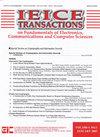A User Allocation Method for DASH Multi-Servers Considering Coalition Structure Generation in Cooperative Game
IF 0.4
4区 计算机科学
Q4 COMPUTER SCIENCE, HARDWARE & ARCHITECTURE
Ieice Transactions on Fundamentals of Electronics Communications and Computer Sciences
Pub Date : 2023-01-01
DOI:10.1587/transfun.2023ssi0001
引用次数: 0
Abstract
Streaming systems that can maintain Quality of Experience (QoE) for users have attracted much attention because they can be applied in various fields, such as emergency response training and medical surgery. Dynamic Adaptive Streaming over HTTP (DASH) is a typical protocol for streaming system. In order to improve QoE in DASH, a multi-server system has been presented by pseudo-increasing bandwidth through multiple servers. This multi-server system is designed to share streaming content efficiently in addition to having redundant server resources for each streaming content, which is excellent for fault tolerance. Assigning DASH server to users in these multi-servers environment is important to maintain QoE, thus a method of server assignment of users (user allocation method) for multi-servers is presented by using cooperative game theory. However, this conventional user allocation method does not take into account the size of the server bandwidth, thus users are concentrated on a particular server at the start of playback. Although the average required bit rate of video usually fluctuates, bit rate fluctuations are not taken into account. These phenomena may decrease QoE. In this paper, we propose a novel user allocation method using coalition structure generation in cooperative game theory to improve the QoE of all users in an immediate and stable manner in DASH environment. Our proposed method can avoid user concentration, since the bandwidth used by the overall system is taken into account. Moreover, our proposed method can be performed every time the average required bit rate changes. We demonstrate the effectiveness of our method through simulations using Network Simulator 3 (NS3).合作博弈中考虑联盟结构生成的DASH多服务器用户分配方法
流媒体系统能够为用户保持良好的体验质量(Quality of Experience, QoE),因其可应用于应急培训、医疗外科等多个领域而备受关注。基于HTTP的动态自适应流(DASH)是一种典型的流系统协议。为了提高DASH的QoE,提出了一种多服务器伪增带宽的多服务器系统。这种多服务器系统除了为每个流内容提供冗余的服务器资源外,还设计用于有效地共享流内容,这对于容错性非常好。在这种多服务器环境下,为用户分配DASH服务器对于维持QoE具有重要意义,因此,利用合作博弈理论,提出了一种多服务器的用户服务器分配方法(用户分配方法)。但是,这种传统的用户分配方法没有考虑到服务器带宽的大小,因此在播放开始时用户都集中在特定的服务器上。虽然视频的平均所需比特率通常是波动的,但比特率的波动并没有被考虑在内。这些现象可能会降低QoE。本文提出一种利用合作博弈论中的联盟结构生成的用户分配新方法,在DASH环境下快速稳定地提高所有用户的QoE。我们提出的方法可以避免用户集中,因为它考虑了整个系统使用的带宽。此外,我们提出的方法可以在每次平均所需比特率变化时执行。我们通过网络模拟器3 (NS3)的仿真验证了该方法的有效性。
本文章由计算机程序翻译,如有差异,请以英文原文为准。
求助全文
约1分钟内获得全文
求助全文
来源期刊

CiteScore
1.10
自引率
20.00%
发文量
137
审稿时长
3.9 months
期刊介绍:
Includes reports on research, developments, and examinations performed by the Society''s members for the specific fields shown in the category list such as detailed below, the contents of which may advance the development of science and industry:
(1) Reports on new theories, experiments with new contents, or extensions of and supplements to conventional theories and experiments.
(2) Reports on development of measurement technology and various applied technologies.
(3) Reports on the planning, design, manufacture, testing, or operation of facilities, machinery, parts, materials, etc.
(4) Presentation of new methods, suggestion of new angles, ideas, systematization, software, or any new facts regarding the above.
 求助内容:
求助内容: 应助结果提醒方式:
应助结果提醒方式:


